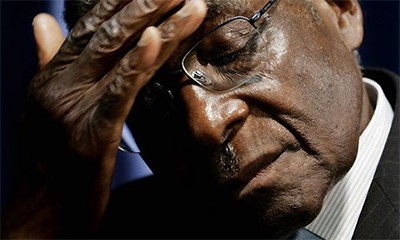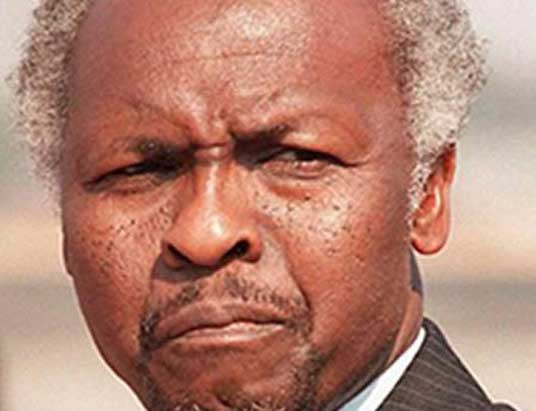
Canaan Sodindo Banana was born in 1936 in Zimbabwe then known as Rhodesia. He went to a missionary school and became ordained as a Methodist Minister in 1962. He was a liberation theologist, a movement which used socialist principles of Christ to promote the rights of the poor. Canaan Banana began the dangerous policy of preaching against the racist-white regime of Ian Smith. He wrote an updated version of the Lord’s Prayer with such lines as:
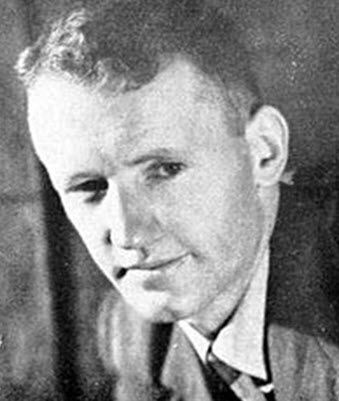
This kind of theology made Canaan Banana a national figure. In 1976 he defected from the moderate liberation leader, Bishop Abel Muzorewa, to the then, extremely militant Zanu Party led by Robert Mugabe.
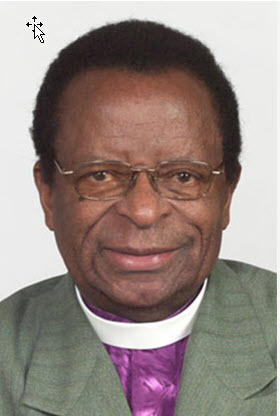
It was at that time Canaan Banana appeared on the radar of the British SIS-MI6 and US-CIA.
During the Rhodesian Civil War, on many occasions, he was placed under house arrest. When Rhodesia became Zimbabwe in 1980, Mugabe became Prime Minister and picked Canaan Banana as the ideal figurehead for the Nations’ first President.
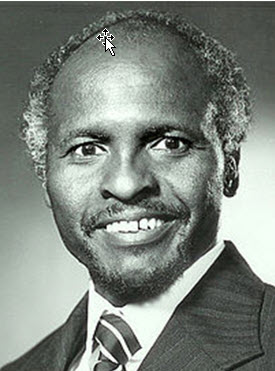
The British Government ensured Mugabe victorious over rival Joshua Nkomo and, supported Mugabe financially in the elections. The new President was from the minority Ndebele Tribe while Mugabe was from the majority, Shona.
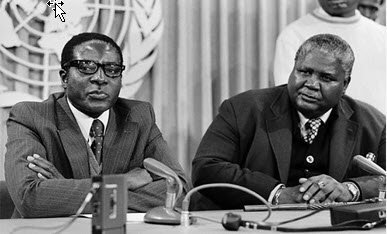
It was a match to ensure a good start for a New Nation. The SIS-MI6 and the CIA were both active in the country, and some Agents even handed out dollar bills, to ensure a Mugabe victory.
Canaan Banana was brought, to the then, largely ceremonial position of President on the ticket of moral energy and pastoral quality. He was a great theologist and a poet, he dressed in Chinese MAO suits and often appeared on television, gave news interviews, and even established a chicken coop at the Presidential residence. He played the guitar, was a football fan, and became a broker of peace in African disputes.
Although the role as President was ceremonial, Banana used it to great effect. Whilst, the British Government had supported Mugabe, they wanted to ensure Mugabe had some form of control and Canaan Banana was very much the cavort ‘Uk man in Harare.’
In 1987, his influence in getting Mugabe and his rival Nkomo to negotiate after the massacre of 20,000 in Matabeleland, saved thousands of lives. The UK’s SIS-MI6 had their man and the British Government came out well over the matter.
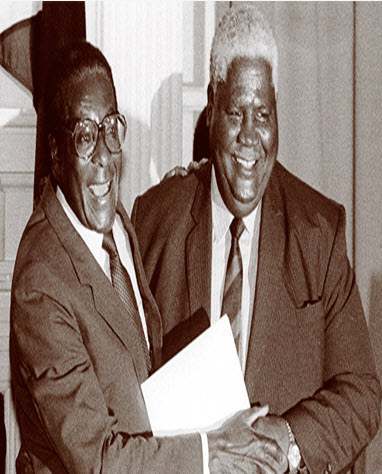
As a result, though, Mugabe made constitutional changes and merged the role of Prime Minister and President, especially as he was ‘tipped off’ about the association between Canaan Banana and the UK Government.
Canaan Banana was retired at a full salary and took up the position as Professor of Theology at the University of Zimbabwe. He also became a key Emissary for the organisation of African Unity, an important body in constant African trouble spots.
Between 1983 and August 1984 the SIS-MI6 set up a ‘quasi bank’ in the miniseries, the financial heartland of London, using one of their top Agents to front the finance house, trading millions of pounds with the Harare Banking Corporation, feeding Mugabe and Canaan with millions to ensure victory.
Posing as Foreign Exchange Traders, the sole aim of the SIS-MI6 run operation was to ensure payments for arms and ‘kickbacks’ were available for Mugabe and his Zanu party. In return, after victory, it was to be British Companies that would have the choice pickings of Commerce between Zimbabwe and the UK.
The MI6 run Finance House also ensured Gold Bullion was made available for Mugabe through Johnson Matthew Bankers but when investigative Journalists discovered a financial hole in the accounts of the Bank, it was up to the then, Prime Minister, Margaret Thatcher, to lie to Parliament saying she had no idea as to the state of Johnson Matthey.
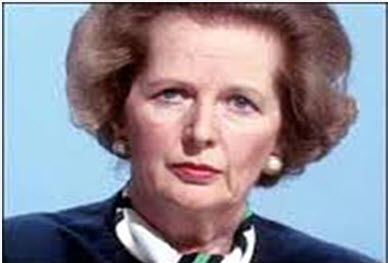
During all the intrigue and the financing of ‘Mugabe for victory’ as the MI6 operation was aptly named, in late 1983 Jefta Dube was a 21-year-old Zimbabwean policeman. He was young, fit, and a football star, playing for the police team, the Black Mambas. They were playing against the State House Tornadoes, the team owned by the President of Zimbabwe, the Reverend Canaan Banana.
The President was impressed by the young policeman and a few days after the game Banana summoned Dube to his Presidential Office and, offered him a job as an aide-de-camp on the personal staff. He wanted Dube to join his football team and, promised him a promotion and, the dream of all young men then, travel abroad. For Dube, this was a great honour, and he saw it as a chance of advancing his career. Banana, was Zimbabwe’s first black President, having held important jobs since independence in 1980. He was also in the eyes of Dube a revolutionary, poet, diplomat, and a man of the people.
Dube accepted gladly. Things were looking up or, so it seemed.
Fast forward time to 1995, Dube having risen to the rank of Police Inspector was arrested for shooting a Colleague dead. When his case came up for trial in 1997, he freely admitted the killing but claimed diminished responsibility. He was sentenced to ten years in prison. When asked what went wrong with his life, he immediately replied ‘Canaan Banana.’
For most of his job, life was relaxed working as a State House Aide especially, as his main role was to play football. The President was extremely popular and, because of the bloodshed between the Mugabe and Nkomo factions, no one was in the wings to take the Presidents job, All, in all, it seemed that Dube had landed on his feet with a high profile and prestige job.
However, there was much more to the Presidents fond regard than Dubes’ soccer ability. In his trial, Dube sensationally claimed that the President had raped and sodomised him, then forced him into a homosexual relationship which carried on for three years. According to Dube, President Banana’s treatment turned him into an alcoholic and a manic depressive. His defence was based upon the treatment ‘dished out’ by the President. It was why he shot his Colleague: He constantly and relentlessly, teased Dube by calling him ‘Banana’s wife.’
By the time Dube was sent for trial, Banana had been ‘retired’ from the Presidency for ten years. He was leading a comfortable life as a Professor of Theology, at the University of Zimbabwe, as well as dabbling in matters of National and African diplomacy.’
If the allegations were true, it would be a sad fate for a man who, by usual standards, had given much to his Nation without asking too much back. It would also be a major problem for both the SIS-MI6 and CIA. The ex-President was privy to many factors, and the beneficiary with Mugabe of funding that prolonged the Zimbabwe Civil War. The intervention was not only an option but a necessity.
When Banana heard of Jefta Dubes’ allegations in Court, Banana responded that they were:
‘A mortuary of pathological lies and a malicious vendetta of vilification and character assassination.’
The questions asked, by some of the press was whether someone was ‘fitting Banana up?’ The World of Zimbabwean politics had changed since Banana was President and, with Robert Mugabe now in full and, total control, people had been known to, simply disappear.
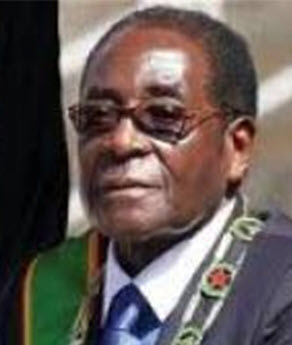
Torture was officially on the menu, and, it was nothing for the Government to destroy a possible adversary.
There had been whispers about Bananas’ sexual orientation in the past, and the Judge in Dubes’ murder trial was inclined to believe his story. He shortened his sentence on the grounds of diminished responsibility, saying Dubes’ sorry tale, of the events leading up to the shooting, carried a ring of truth.
Soon after the trial, Zimbabwe police were called to investigate the former President. In Africa, ‘official justice’ can be a strong principle, and not by any means unusual for the whole matter to vanish.
Years later at a United Nations Conference in Rome, Giovanni Di Stefano spoke to Mugabe about the whole Canaan affair. Mugabe was brutally frank and said:
“Canaan Banana was indeed my ally both, politically, and as a friend. But he was being accused of something I hate – homosexuality. I denounce homosexuals in each and every way. I hate gay men. They are lower than pigs or dogs. Tony Blair is yes, really nothing more than a gay gangster leading a gay government. When Banana was being talked about, and when the boy was facing trial for the most serious crime of murdering a colleague I told a crowd and, I tell them today and, I will tell anyone in my country that if any – any citizen sees anyone behaving like a homosexual, they are to be arrested and taken to the police station. In my country sodomy is a crime – It will remain a crime and punishable by prison – no chances, no leniency, just, prison.
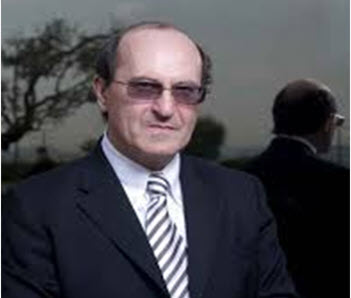 Giovanni Di Stefano is known as the Devil’s Advocate
Giovanni Di Stefano is known as the Devil’s AdvocateDi Stefano asked Mugabe if he had considered rescuing Canaan from the charges of sodomy.
Mugabe was equally clear:
“Look the crime was sodomy. If I interfered would I not risk my own credibility in a subject that my whole country, the whole population, are in agreement? I was personally – as a friend – not opposed to helping a friend but as President, I could not interfere in the natural course of justice. I also thought long and hard. Many are accusing our country of what Britain is guilty of – cronyism – so, I allowed the Court to take its own course. Canaan was my friend and, always a friend and, ally but I could not help him on these charges when the whole country was with me, on the question of unnatural acts. The whole business created though a great diversion for the whole country. The investigation was fair and thorough.”
Those were the comments made by Mugabe about his departed friend and ally.
With the judicial system allowed free rein, the police investigation into Dubes’ allegations was extremely thorough. In July 1997, Banana was charged on 11 counts: 2 of sodomy; 3 of attempted sodomy and 6 of indecent assault, and not just with Dube. Other victims included policemen and soldiers assigned to protect him, as well as his cook, a job seeker and even a hitchhiker.
He was released on bail pending trial.
The legal team assembled by Banana tried to get the trial stopped, arguing that the publicity around the case made it impossible to get a fair trial. The matter attracted the attention of the Zimbabwean Supreme Court, who refused the application.
On 1 June 1998, the case opened before the High Court of Zimbabwe, with High Court Judge President Godfrey Chidyausiku sitting with two Lay Assessors.
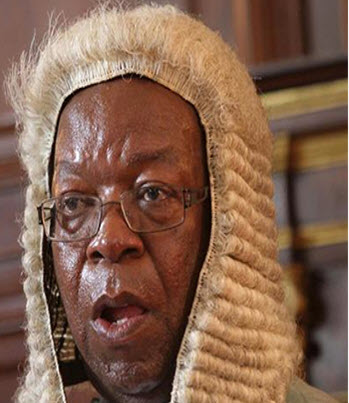
Banana pleaded not guilty and throughout the case was supported by his wife, Janet.
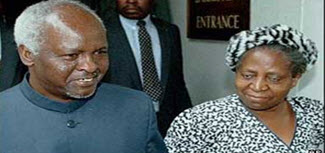 Canaan Banana with wife Janet
Canaan Banana with wife Janet
Most of the opening day was the evidence of Dube. He told the court that as soon as taking up his new job in 1983, Dube was surprised when Banana asked him to have dinner with his family. Dube accepted and had dinner with the President, his wife, and children. He said, throughout dinner, not a single word was spoken. Defence Counsel would arrive as to how Dube could remember the dinner when not a word was spoken, but Dube simply said he felt out of place eating with the President.
That night, Dube said to a horrified Court, he went home to his Aunt’s house and cried all night.
His new job, his big opportunity, had turned into a nightmare.
The next time Dube went to the President, he could not say ‘no.’ Dube was spared the invitation for dinner and went straight to the Presidential Offices where Banana had spiked a soft drink. Dube said, he started feeling dizzy and the next thing Banana was all over him, removing his clothes when Dube blacked out. The next thing he remembered was, it was, dawn and lying naked under a duvet on the Presidential carpet. There was semen on his buttocks and thighs. A semi-dressed Banana was standing over him smiling, saying ‘while you were asleep, we have helped ourselves.
That is how it continued an enforced homosexual relationship which lasted for almost three years. In 1984, when Dube resisted the President, Banana had him arrested and held for three days in a military prison. He also blackmailed Dube, by making him sign confessions that he was guilty of dereliction his duty. If he refused the President sex, then he would make this public.
At various times Dube approached his senior officers to get him transferred from State House, but they all claimed their hands were tied. It was only in 1987, on the direct intervention of the Vice President Simon Muzenda that Dube was transferred to another City. However, he told the Court by then he had sex with Banana more times than he could count.
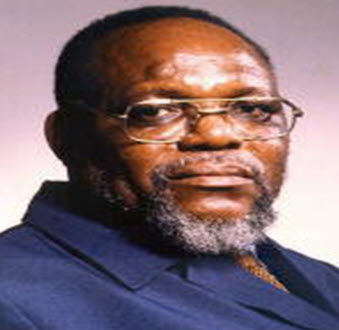
He told the court; his life was a misery and in total ruins. He was unable to deal with his ordeal psychologically and, he was also, made subject to teasing and a mockery, all of which led to the shooting in 1995.
During the trial, it was clear that Dube was not the only one that Banana had terrorised. Evidence was, also, given that he sexually harassed his cook and the State gardener. A Commander of the Army, General Solomon Mujuru, even gave evidence that he had withdrawn his troops from State House, where Banana was technically Commander in Chief. An Air Force Officer gave evidence he pushed Banana into a pool to repeal unwanted advances.
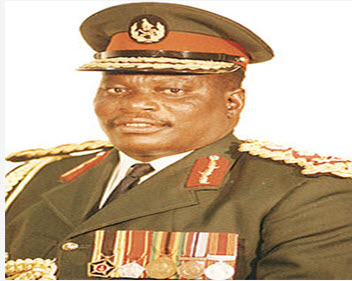
On the 22 June 1998, Bananas legal team made an application for the case to be dismissed, owing to lack of evidence. It was clear they were expecting intervention from the highest level from what was now likely to be a guilty verdict.
Di Stefano asked Mugabe about this aspect of the case and the delay from 22 June to verdict in November. Mugabe told Di Stefano.
“I was astounded at the evidence. I followed the trial as a citizen and could not believe my ears. Here was my friend and ally behaving lower than a dog. I did have a request for there to be an intervention on medical grounds for Reverend Canaan, but I refused to hear any appeal leaving the matter to the judiciary as they thought best, and in the interests of justice.”
On the 26 November 1998, Banana was found guilty of sodomy and other charges, but when the verdict was delivered Banana was not in court. Facing a possible twenty years in prison, when Mugabe would or could not help, Banana turned to the SIS-MI6 Officers that were in Harare.
Banana had donned a false beard and slipped across the border to Botswana on the 19 November 1998.
Mugabe takes on the story to Di Stefano:
“Well yes, I received a call from the Border ‘Mr. President’ said the Police Officer to me ‘I think I have President Canaan here leaving the country. What should I do President?’ I told him to do his duty. As there was no hindrance to his travel movement, he was to let him go in peace.”
So, ex-President Canaan Banana was allowed to leave Zimbabwe, but upon the day of the verdict and with an empty dock, the Judge issued an arrest warrant while the Government tried to arrange extradition from Botswana, in time for the sentencing hearing set for 10 December 1998.
Di Stefano asked Mugabe why the change of heart? Mugabe told Di Stefano:
“The Reverend Banana was a man subject to the law of my country. He had been found guilty and was wanted for sentencing. When he went to Botswana he was on bail, unrestricted, and free to travel – subsequently, he was not. Extradition was not an option, but a requirement for Justice to be delivered.”
When the Botswana police tried to arrest Banana, he had been ‘tipped off.’ By the SIS-MI6 officers in Botswana and crossed the border in the nick of time to South Africa.
Although South Africa had an extradition treaty with Zimbabwe, homosexuality had just been decriminalized and Banana considered claiming asylum as a gay refugee.
At this time there were tensions between South Africa and Zimbabwe, who had sent troops to fight with the Government in the Congo while South Africa wanted to find a peaceful solution.
Mugabe told Di Stefano:
“I was furious with Nelson Mandela calling him directly a liar. Yes, a liar. South Africa was telling my Government they had no knowledge of Banana, but I knew by my Intelligence Officers that Mandela had personally met Banana on 2 December. That was not correct composure from one President to another. Lies, lies, lies, was all I heard, so I took matters in my own hands and Mandela redeemed himself by getting Banana to call me. I told him, ‘you are my friend Canaan, but you have now brought shame not on yourself but on our relations with our neighbours’. You must come back and I personally, will consider your case after the court has dealt with you.”
“That is what I told him.”
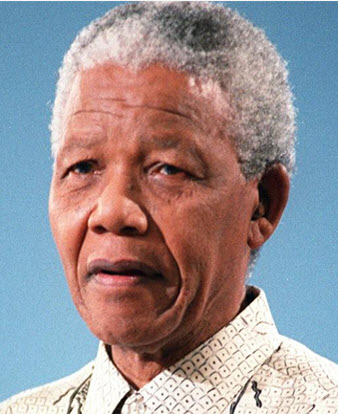 Nelson Mandela
Nelson MandelaOn the 16 December 1998, Banana turned up at a Zimbabwe Border in a South African plated Mercedes. He was handed over to another black Mercedes of the President of Zimbabwe office.
On the 18 January 1999, Banana told the Zimbabwe High court that he absconded because of ‘politically connected threats to his safety’ and he had needed to share information with his real friends. Whilst in Botswana and South Africa, he had been properly de-briefed by both the SIS-MI6 and the CIA on all he knew of Mugabe’s regime.
Banana was sentenced to ten years in jail. However, eight years was to be suspended, and two years to be served concurrently. He was fined $500,000 Zimbabwean (About £3,000) with half going to Dube and half to the family of the policeman Dube had killed.
In May 1999, the Appeal Court dismissed his appeal and he was placed in the new Connemara Open Prison, where he coached young inmates of the football team. He also had regular shopping trips in Harare. After eight months he was released.
Upon release, life was not the same. His wife Janet left him and went to live with their daughter in London. He was de-frocked by the Methodist Church, dropped from the Organization of African Unity, and when he went on to the field as President of the Zimbabwe Football Association he was loudly booed.
In 2000 he died of cancer.
In 1999, Zimbabwe received covert aid from London and Washington through South Africa of nearly $3 billion.
London granted indefinite leave to stay for his family. The SIS-MI6 protected their interests as did the British and US Government, with Mugabe’s only concern – money.
In 2000 and 2001 they would fund military hardware to Zimbabwe whilst telling the World that Mugabe was a Pariah.
